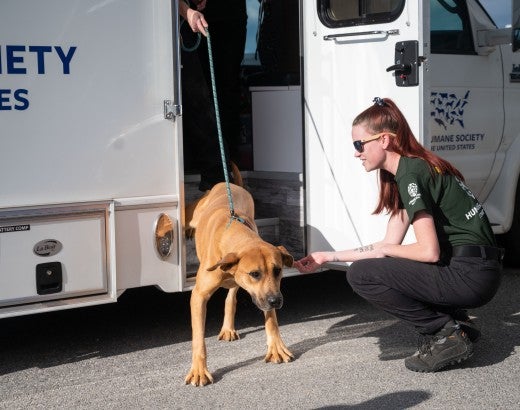Recently, I told you about promising developments in the fight against dog meat in China, where law enforcement, government and animal advocates worked together to shut down an illegal slaughterhouse and rescue the 126 dogs found alive inside.
Now I want to take you to Gyeonggi-do, South Korea, where Humane Society International/Korea and partner Korean K9 Rescue just rescued 21 dogs who had been left behind when an illegally operating dog meat farm was shuttered. Romeo, Henry, Tori, Juliette, Brown Bear, Christian and the other dogs are now in quarantine receiving veterinary care and vaccinations. When they’re ready, we will fly them to North America to find them homes.

It was a close call for these dogs. HSI/Korea stepped in to help save them after the Ansan city authorities shut down the facility for operating without a license. Initially, local government officials removed 38 dogs to their shelter for rehoming but left these 21 behind with a deadline for removal. If no one rescued the dogs by the deadline, they were at risk of being killed or sold to a slaughterhouse. The rescue comes just days before the start of Boknal, three days during the summer when the country’s usually low consumer demand for dog meat increases and dog meat is used to make bosintang,” a type of soup.
We are working to ensure that dog meat is on its way out in South Korea. HSI/Korea, in addition to working with farmers to permanently close dog meat farms in the country and assist local groups and law enforcement in rescuing dogs, also campaigns for legislation in South Korea to end the dog meat industry. Since before President Yoon Seok-yeol took office this year, a task force has been deliberating a potential nationwide dog meat ban but, for the second time, the task force has delayed announcing its recommendations. We are holding out hope that the announcement we’ve been working towards for years will soon arrive, but we know we have to keep the pressure up for these dogs.

The farmer, who had been breeding dogs for human consumption at the site for six years, signed an agreement never to farm dogs again. He told us that he plans to make his money from handyman work, which is what he’s been doing anyway. “When I took over the farm,” he said, “the seller deceived me and my partner by telling us it would be a profitable business, but it simply hasn’t been true.”
What heartens me about both of these recent rescues, though each situation was different, is how local authorities are increasingly seeing us and our animal advocate partners as resources to help coordinate care, comfort and homes for dogs saved from terrible circumstances. Not only is this lifesaving for the dogs in the moment, but it is also a testament that our work saving animals is a legitimate, valued part of responding to illegal activity in the dog meat trade.
You can help support rescues of dogs from the dog meat trade
Follow Kitty Block on Twitter @HSUSKittyBlock.



